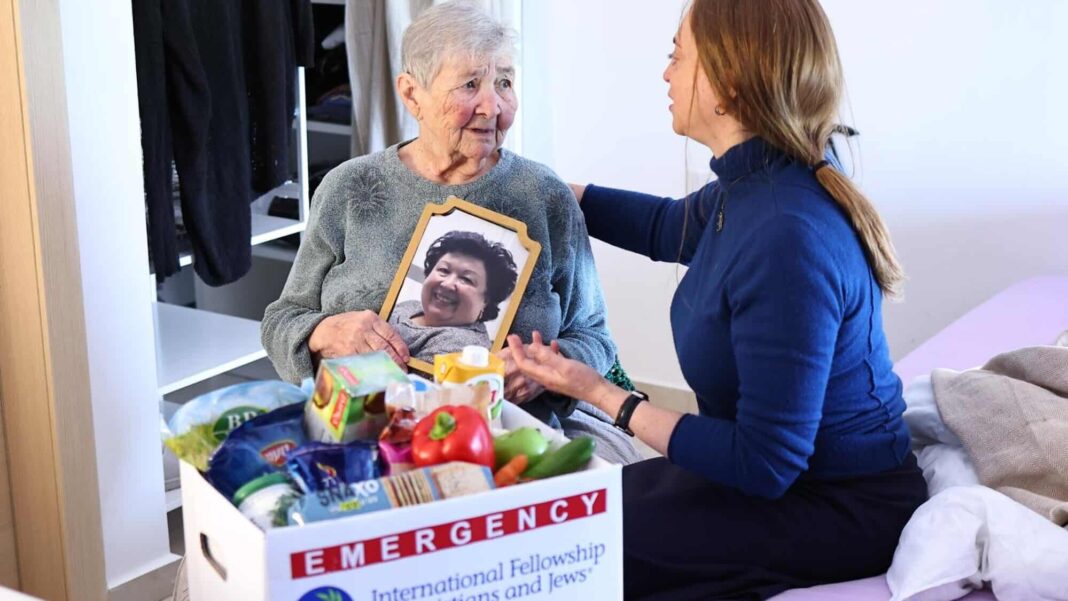|
Getting your Trinity Audio player ready...
|
By Josh Hasten
(JNS) Ceremonies are being held around the world on Monday, Jan. 27, to mark International Holocaust Remembrance Day. The date for the annual commemoration was proclaimed by the United Nations in November 2005, marking the date of liberation of the Auschwitz-Birkenau Nazi death camp by the Soviet army on Jan. 27, 1945. It is now 80 years since the camp’s liberation.
According to the U.S. Holocaust Memorial Museum the purpose of the day is two-fold: “To serve as a date for official commemoration of the victims of the Nazi regime and to promote Holocaust education throughout the world.”
Statistics shared by the International Fellowship of Christians and Jews (IFCJ), an organization that provides vital assistance to Holocaust survivors, shows there are about 240,000 living survivors (as of 2023), with around 147,000 residing in Israel.
Unfortunately, according to Israel’s Welfare and Social Affairs Ministry, approximately 2,500 Holocaust survivors were thrust into extreme trauma once again by the events surrounding the Oct. 7, 2023, Hamas massacre. In addition, around 2,000 survivors were forced to flee their homes as a result of the ensuing war.
Galina Bailin, 87, from Ukraine, managed to survive the Holocaust as a small child when her family fled to Uzbekistan. Her older brother was murdered by the Nazis, and another brother was disabled fighting for the Red Army. With the fall of the Iron Curtain, she made aliyah to Sderot, opposite the Gaza Strip, in the early 1990s.
Bailin told JNS (via a translator) that on the evening of Oct. 6, 2023, she was visiting her daughter Zena, 60, who also lives in Sderot, as she did nearly every week.
Early in the morning on Oct. 7, Zena drove her mother home, as Zena was scheduled to spend a day of fun with other adults and seniors as part of an organized trip to the Dead Sea for residents from several area communities.
As they entered the house, sirens wailed, warning of incoming rockets, and Galina urged her daughter to cancel her plans. However, Zena refused, as she had already paid for the trip.
Zena met up with the group and got into a minivan. A flat tire forced the vehicle to pull over at a bus stop. Not long after, Hamas terrorists who had infiltrated Sderot approached the stranded pensioners, shooting 13 dead at close range, including Zena.
Galina, who lives adjacent to the Sderot police station, could hear the battle taking place there between the police and terrorists from Gaza. When Zena didn’t answer the phone or return Galina’s calls, she was justifiably concerned.
“During the Shoah when I was a little girl, I wasn’t afraid because my mother was protecting me. We didn’t have a lot to eat, only rice and rice pudding for years, but my mother made sure there was food,” she said.
“But now, on Oct. 7, I was afraid, and I feel guilty I couldn’t protect my daughter the way my mother protected me,” she added.
“At my daughter’s funeral I felt like my life was over, that I no longer had a reason to live. But my grandchildren and great-grandchildren, they say, ‘Grandma, we need you.’ They are the ones keeping me alive.”

Alla Lopatin, 93, managed to flee the Nazis with her family by train from the town of Bialystok in Poland, moving to eastern Ukraine and eventually Siberia. She remembers the trains stopping and having to routinely hide under the cars during German bombings.
She told JNS (via a translator) that she attributes her family’s survival to her father’s role in the Soviet army. The family was given preferential treatment, including clothing and a special card for bread, which she remembers waiting in line for at 5 a.m. Lopatin said that people were sometimes murdered for these cards.
The family made aliyah to Israel after the fall of the Iron Curtain in the 1990s, first to Safed, before moving to the northern border town of Kiryat Shmona.

Lopatin’s daughter Irina, Alla’s sole caretaker and provider, is a dentist with a clinic in Kiryat Shmona. They were evacuated from the city after Hezbollah opened a second front on Oct. 8. The two are currently renting an apartment from a friend in Jerusalem.
Irina told JNS they are experiencing extreme financial difficulties, as they are currently paying rent and arnona (property tax) on the dental clinic. The clinic and their apartment were both damaged as a result of rocket attacks and need repair.
Both mother and daughter said they are afraid to go back home.
“This evacuation reminds me of the first evacuation I went through during the Shoah. I was very afraid [after Oct. 7]. I couldn’t believe something like this could happen here in Israel. I feel safe here in Jerusalem, but I don’t know when we will be going home,” said Alla.
“The horrible trauma and suffering of these two women—and, sadly, so many others in Israel today—must move us to action,” said Yael Eckstein, president of IFCJ.
“For those survivors who have suffered, first in the Holocaust, and again on Oct. 7, we have a huge obligation—to turn remembrance into action. IFCJ is committed to providing emotional and material support, kindness, and dignity to those who have been through the worst,” she continued.
“Every hour, at least two Holocaust survivors die. And so, for these final years that they are with us, we will do everything to make sure that they are living with dignity and hope,” she added.
Since the beginning of Israel’s war in the north and the south, IFCJ has distributed over $132 million in aid to Israelis, including Holocaust survivors, deeply affected by the war, providing basic needs and strengthening civilian defense systems throughout the country.




